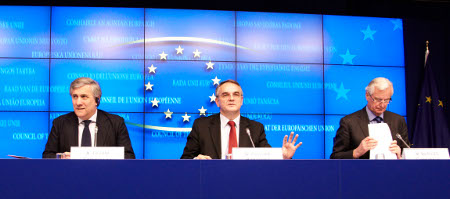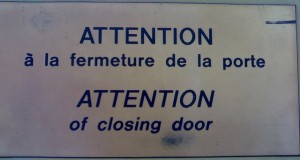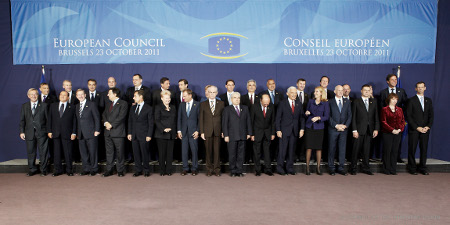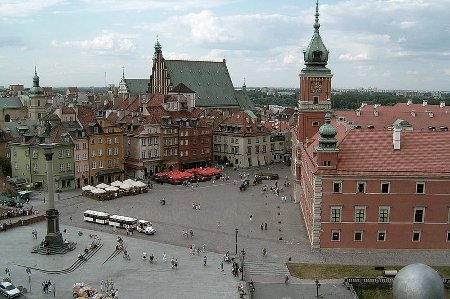
Mr Antonio TAJANI, Vice President of the European Commission (left) - Mr Waldemar PAWLAK, Polish Deputy Prime Minister and Minister for Economy, President of the Energy Council - Commissioner Michel BARNIER
Yesterday, the first day of the 3133rd Council meeting in the Competitiveness configuration (Internal Market, Industry, Research and Space) was held in Brussels under the EU Presidency, chaired by Mr Waldemar PAWLAK, Deputy Prime Minister and Minister of Economy of Poland. Document 18115/11 conveys a press release saying :
Continue reading »
Today, the EU Council published a packed agenda (MEMO/11/864) for the meeting of the Competitiveness Council under the current Polish Presidency on Monday and Tuesday next week in Brussels (see webcast). Further, this background note tells us that the Council will “examin[e the] files related to the creation of unitary patent protection and of a unified patent litigation system” in the afternoon of Monday 5th.
Warsaw, December 22, 2011: The Day Of Initialling The EU Unified Patent Court
Document 17539/11 authored by the Polish EU Presidency, titled Draft Agreement on the creation of a Unified Patent Court – Guidance for future work and directed to Permanent Representatives Committee ( COREPER Part 1) unveils under item 11 thereof:
The Presidency announced its intention to organise the initialling ceremony whereby the text of the Agreement could be finalised in Warsaw on 22 December 2011. The Presidency considers that the Member States should be able to arrive at a political agreement on the text of the Agreement at the meeting of the Competitiveness Council on 5 December 2011 on the basis of this set of compromise proposals, despite the fact that some issues of political importance could be left to be agreed at a later stage, but before the signature of the Agreement.
Well this appears to be quite big an issue. Why? Well, … in Document 16741/11 titled Draft agreement on a Unified Patent Court and draft Statute – Revised Presidency text we see current wording of Article 5 (1a) printed as follows:
(1a) The central division shall have its seat in [...]. The contracting Member State hosting the central division shall provide the necessary facilities for that purpose.
And, in a corresponding way, current wording of Article 7 (4) reads:
(4) The Court of Appeal shall have its seat in [...].
It is to be understood that the the initialling ceremony scheduled to happen in Warsaw on December 22 would be pointless if there isn’t a finalsed text of the entire Agreement ready for signing .. without those ellipsis in Articles 5 (1a) and 7 (4).
With other words: A political decision as to how to locate the seat of central portions of the UPC system is due to well ahead of the planned ceremony in Warsaw. For more details on the timetable, see also Volker Metzler’s post on visaepatentes.com.
Continue reading »
 As reported earlier on this blog (see here), the EU Commission is giving high priority to implementing the Unitary Patent and related Unified Patent Court System, in fact, “the objective is to reach agreement on a new patent system by the end of the year” (see MEMO/11/643).
As reported earlier on this blog (see here), the EU Commission is giving high priority to implementing the Unitary Patent and related Unified Patent Court System, in fact, “the objective is to reach agreement on a new patent system by the end of the year” (see MEMO/11/643).
In one of our latest articles, we reported that European executive authorities are now, as the end of the year approaches, “rushing to set up the EU Unified Patent Court“. (see Document 17317/11). But also the legislative authorities in charge – the European Parliament and its Legal Affairs Committee “JURI” – are heavily involved, as has been reported on this blog either (see here or here).
However, as the Executive (i.e. the European Commission and Council) can only suggest a new or amended piece of law, a parliamentary process that may be required to put the law in force might be longish and troublesome - especially if a self-confident Parliament has to decide on a controversial and rarely used legal institution as enhanced cooperation in case of the implementation of the Unitary Patent. As the Unified Patent Court system will be implemented by international agreement between 25 EU member states (EU27 except Spain and Italy), the EU Parliament will not have to adopt a formal position on that issue. Nevertheless, Klaus-Heiner Lehne, Rapporteur of the JURI Committee came up with a Draft Report on a jurisdictional system for patent disputes (2011/2176 (INI)), as reported here.
To ensure that broad discussions and public comments would not endanger the ambitious time schedule for reaching an agreement, the three Rapporteurs of the the JURI Committee – Bernhard Rapkay (S&D, Germany), Raffaele Baldassarre (EPP, Italy), Klaus-Heiner Lehne (EPP, Germany) – have been equipped on 22 November 2011 with a mandate (see agenda, nos. 33, 34, 35) to negotiate the agreement on the Unitary Patent and the related Language Regime with the European Council in back rooms behind closed doors. (see e.g. press release as well as press reports [1] and [2]).
On November 22, 2011, the General Secretariat of the Council of the European Union has sent Document 17317/11 to the Permanent Representatives Committee (COREPER Part 1) titled Draft Agreement on a Unified Patent Court and draft Statute – Draft Declaration for an operational UPC – Revised Articles 18, 19, 58, 58a, 58d and 59. Following up to discussions having taken place in the Permanent Representatives Committee on November 18, 2011, on the basis of the Note to the Permanent Representatives Committee contained in 17120/11 REV 1 (not published), the Polish EU Presidency has submitted, for discussion on November 23, the following texts :
- A draft Declaration, to be made by the Contracting Member States upon signature of the Agreement, ensuring that the future Unified Patent Court shall be operational at the moment its enters into force (see Annex I) as referred to in point 8 of the above Note;
- Revised drafts for Articles 18, 19, 58, 58a, 58d and 59 (changes in relation to the previous version set out in 16741/11 are underlined) (see Annex II), which reflect proposals of the Presidency as outlined in the above Note.
The Draft Declaration sets out the political will power not only to rush the Unified Patent Court (UPC) through as fast as possible but also to make sure that it will be operational immediately after it has been formally set up (Annex I):
Continue reading »
Even beyond the Draft Report on a jurisdictional system for patent disputes (Rapporteur: Klaus-Heiner Lehne) reported earlier (here and here) there appear to exist a number of interesting papers of the Committee on Legal Affairs of the European Parliament (JURI) available on-line:
- Document PE472.331v01-00: Amendments 1 – 25 / concerning “Motions for a resolution” – Draft report by Klaus-Heiner Lehne (2011/2176(INI)) – Jurisdictional system for patent disputes;
- Document PE472.334v02-00: Draft Report on the proposal for a Council regulation implementing enhanced cooperation in the area of the creation of unitary patent protection with regard to the applicable translation arrangements (COM(2011)0216 – C7-0145/2011 – 2011/0094(CNS)) including Amendments 1-19; Rapporteur: Raffaele Baldassarre;
- Document PE472.334v02-00: Amendments 20 – 47 / Draft report by Raffaele Baldassarre (2011/0093(COD)) - Enhanced cooperation in the area of the creation of unitary patent protection with regard to the applicable translation arrangements; and
- Document PE472.059v02-00: Draft Report on the proposal for a Regulation of the European Parliament and of the Council implementing enhanced cooperation in the area of the creation of unitary patent protection (COM(2011)0215 – C7-0099/2011 – 2011/0093(COD))including Amendments 1 – 44; Rapporteur: Bernhard Rapkay; and
- Document PE472.059v02-00: Amendments 45 – 94 / Draft report by Bernhard Rapkay (2011/0093(COD)) - Proposal for a regulation of the European Parliament and of the Council implementing enhanced cooperation in the area of the creation of unitary patent protection / Proposal for a regulation (COM(2011)0215 – C7-0099/2011).
These papers apparently have been discussed during the recent meeting of the Legal Committee held on November 21-22, 2011, in Brussels (Document PE475.963v01-00). I have no clue so far as to the outcome of that session.
Continue reading »
It has just now come to my attention that on September 23, 2011, the Committee on Legal Affairs of the European Parliament has published a Draft Report on a jurisdictional system for patent disputes (2011/2176(INI)) (Rapporteur: Klaus-Heiner Lehne). The document comprises a text of a motion for a European Parliament resolution on a jurisdictional system for patent disputes (2011/2176(INI)) generally acknowledging that the establishment of a coherent patent litigation system in the Member States taking part in the enhanced cooperation should be accomplished by an international agreement between these Member States creating a Unified Patent Court. However, there is an interesting twist:
Continue reading »
Yesterday I wrote a post reporting on the publication of EU Council Document 15539/11 conveying another version of the Draft agreement on a Unified Patent Court and draft Statute. Apparently there seems to be some political desire to get this thing done – together with Draft Regulations implementing enhanced cooperation in the area of unitary patent protection (Document 11328/11) – by finalising the entire package by end of this year.
To me it is quite a bit open as to whether or not this ambitious target will be met. We are amidst a grave stress test of the Euro framework, perhaps even of the EU itself. And, members of the political elites in all of the EU Member States are extremely busy to pretend as if they were aware of any viable solution advising how to exit this situation which perhaps might be reported in future textbooks of history as the worst crisis of the European Union ever. Will there be sufficient time and political will power to sort out problems in the field of patent law? I remember well the months of the French EU Presidency from July to December 2008. Up to September 2008 there had been strong hopes that French President Mr Sarkozy to take the bull at its horns and force a political compromise in the nasty languages issue concerning the original proposal for a EU Community Patent covering all of the EU Member States, including Italy and Spain. But on September 15, 2008, Lehman Brothers had to file for bankruptcy, and the world was no longer the same as it had used to be. The French Government had to shift their priorities, and Mr Sarkozy did not make it to push a compromise towards the EU Community Patent during his time at the helm of EU Presidency.
If the approach now pending – ‘enhanced co-operation’ – succeeds, what will be the practical consequences of its implementation?
Continue reading »
On October 19, 2011, the Polish EU Presidency has issued Document 15539/11 titled Draft agreement on a Unified Patent Court and draft Statute – Revised Presidency text. Changes in relation to the previous as provided with the version as of Document 15289/11 are marked. The provisions in italics marked with square brackets are still being developed as their final version depends either on the drafting technique to be adopted or on the content of the planned Commission proposal on changes to the acquis communitaire itself. Articles 14b and 14c now read:
Continue reading »
On October 07, 2011, the Polish EU Presidency has sent Document 15289/11 to the Delegations of the EU Member States for carrying on with negotiating an Agreement for a Unified Patent Court during a technical drafting session to be held from October 12-14, 2011 in Warsaw. The Document is titled Draft agreement on a Unified Patent Court and draft Statute – Revised Presidency text. In the Draft, changes in relation to the previous version (Document 13751/11 + COR 1) are marked. Concerning this elder version see also my earlier post here.
Altogether, the amendments made in Document 15289/11 compared to the previous version of document 13751/11 appear to be more or less of a technical nature. In particular, some conclusions from the non-paper Document 14191/11 titled Compatibility of the draft agreement on the Unified Patent Court with the Union acquis appear to have been drawn. In particular, a new Article 15b now defines the relation of the Unified Patent Court with the jurisdiction of courts of States not party to this Agreement (i.e. Italy and Spain) as follows:
(1) The Court shall have jurisdiction any time the court or courts of a Contracting Member State would have jurisdiction on the basis of Regulation (EC) 44/20019 or, where applicable, on the basis of the Convention on jurisdiction and the recognition and enforcement of judgments in civil and commercial matters (Lugano Convention).
(2) Where proceedings involving the same cause of action and between the same parties are brought in this Court and (a) court(s) of States not party to this Agreement, the Court shall of its own motion stay its proceedings until the jurisdiction of the court first seized is established.
(3) Where the jurisdiction of the court of a State not party to this Agreement is established, the Court shall decline jurisdiction in favour of that court.
Furthermore, a newly introduced paragraph 3 in Article 14c indicates that
The law of non-contracting States shall be applicable where relevant and as provided by provisions of Union law, in particular on the basis of Regulations 593/2008 (Rome I) and 864/2007 (Rome II), or by international instruments.
I expect to get further news next week after the technical drafting session to be held in Warsaw is closed.
The k/s/n/h::law blog
Some of the patent attorneys of the KSNH law firm have joined their efforts to research what is going on in the various branches of IP law and practice in order to keep themselves, their clients as well as interested circles of the public up to date. This blog is intended to present results of such efforts to a wider public.
Blog Archives
- November 2013 (2)
- October 2013 (1)
- September 2013 (1)
- August 2013 (2)
- July 2013 (3)
- June 2013 (5)
- March 2013 (5)
- February 2013 (4)
- January 2013 (5)
- December 2012 (5)
- November 2012 (5)
- July 2012 (5)
- June 2012 (8)
- May 2012 (5)
- April 2012 (3)
- March 2012 (4)
- February 2012 (5)
- January 2012 (6)
- December 2011 (12)
- November 2011 (9)
- October 2011 (9)
- September 2011 (4)
- August 2011 (7)
- July 2011 (4)
- June 2011 (1)
Blog Categories
- business methods (6)
- EPC (7)
- EPO (12)
- EU law (92)
- ACTA (8)
- CJEU (4)
- Comitology (1)
- competition law (2)
- Enforcement (6)
- EU Unified Patent Court (62)
- FTA India (1)
- TFEU (2)
- Trade Marks (5)
- European Patent Law (37)
- German Patent ACt (PatG) (1)
- German patent law (5)
- Germany (6)
- Pirate Party (3)
- International Patent Law (4)
- PCT (2)
- IP politics (10)
- licenses (2)
- Litigation (5)
- Patentability (7)
- Patents (12)
- Piratenpartei (2)
- Software inventions (10)
- Uncategorized (9)
- Unitary Patent (24)
- US Patent Law (4)
Comments
- kelle on Germany: Copyright Protection More Easily Available For Works Of “Applied Arts”
- Time Limits & Deadlines in Draft UPCA RoP: Counting The Days - KSNH Law - Intangible.Me on Wiki Edition of Agreement on Unified Patent Court Agreement (UPCA)
- Time Limits & Deadlines in Draft UPCA RoP: Counting The Days | ksnh::law on Wiki Edition of Agreement on Unified Patent Court Agreement (UPCA)
- Wiki Edition of Agreement on Unified Patent Cou... on Wiki Edition of Agreement on Unified Patent Court Agreement (UPCA)
- European Commission Takes Next Step Towards Legalising Software Patents in Europe | Techrights on EU Commission publishes Proposal of amendend Brussels I Regulation for ensuring Enforcement of UPC Judgements
Blogroll
- 12:01 Tuesday
- America-Israel Patent Law
- Anticipate This!
- AwakenIP
- BlawgIT
- BLOG@IPJUR.COM
- BP/G Radio Intellectual Property Podcast
- Broken Symmetry
- Class 46
- Director's Forum: David Kappos' Public Blog
- Gray on Claims
- I/P UPDATES
- IAM Magazine Blog
- Intellectual Property Intelligence Blog
- IP Asset Maximizer Blog
- IP CloseUp
- IP Dragon
- IP Watch
- IP Watchdog
- IPBIZ
- ipeg
- IPKat
- ITC 337 Law Blog
- Just a Patent Examiner
- K's Law
- MISSION INTANGIBLE
- Patent Baristas
- Patent Circle
- Patent Docs
- Patently Rubbish
- PatentlyO
- Patents Post-Grant
- Reexamination Alert
- SPICY IP
- Tangible IP
- The 271 Patent Blog
- The Intangible Economy
- THE INVENT BLOG®
- Think IP Strategy
- Tufty the Cat
- Visae Patentes
The KSNH blogging landscape


This blog and the German-language sister blog k/s/n/h::jur link to the two popular and privately run blogs IPJur und VisaePatentes and continue their work and mission with a widened scope and under the aegis of our IP law firm.
ksnhlaw on Twitter
- No public Twitter messages.
 KSNH::JUR Feed (german)
KSNH::JUR Feed (german)- Ist Verschlüsselung passé? September 6, 2013Auf verschiedenen Feldern beruflicher Praxis ist dafür zu sorgen, dass Kommunikation vertraulich bleibt. Die trifft beispielsweise für Ärzte zu, aber auch für Anwälte, darunter auch Patentanwälte. Einer der zahlreichen Aspekte, die in diesem Zusammenhang eine Rolle spielen, ist die Technik, um die Vertraulichkeit beruflicher Kommunikation sicherzustellen. Wa […]
- EU-Einheitspatent: Demonstrativer Optimismus und Zahlenmystik allerorten – Naivität oder politische Beeinflussung? June 26, 2013Nach mehreren vergeblichen Anläufen zur Schaffung eines EU-weiten Patentsystems wurde 1973 als Kompromiss das Europäische Patentübereinkommen unterzeichnet, welches unabhängig von der seinerzeit noch EWG genannten Europäischen Union System zur zentralisierten Patenterteilung mit nachgeordnetem Einspruchsverfahren durch das Europäische Patentamt schuf. Wie wi […]
- Moderne Zeiten oder: DPMA und Patentgericht streiten über die elektronische Akte April 25, 2013Bekanntlich hat das Deutsche Patent- und Markenamt (DPMA) im Jahre 2013 mit der rein technischen Fertigstellung der Einrichtungen zur elektronischen Akteneinsicht einen wichtigen Meilenstein seines Überganges von der Papierakte zur “elektronischen Akte” erreicht. Im DPMA werden aber bereits seit dem 01. Juni 2011 Patente, Gebrauchsmuster, Topografien und erg […]
- Gutachten zu Forschung, Innovation und technologischer Leistungsfähigkeit Deutschlands 2013 March 11, 2013Unter dem Datum vom 28. Februar 2013 ist die Bundestags-Drucksache 17/12611 veröffentlicht worden Sie trägt den Titel Unterrichtung durch die Bundesregierung - Gutachten zu Forschung, Innovation und technologischer Leistungsfähigkeit Deutschlands 2013. Die Bundesregierung legt dem Deutschen Bundestag seit dem Jahr 2008 […]
- 3D-Printing: Zum Filesharing von 3D-Modelldaten February 25, 2013In meiner kleinen zuvor angekündigten Reihe über rechtliche Aspekte des 3D Printing komme ich heute auf die Frage zu sprechen, ob die Hersteller von Gerätschaften es hinnehmen müssen, wenn Ersatztreile davon – vom Brillengestell über Smartphone-Gehäuseteile bis hin zu Rastenmähermotor-Abdeckungen – gescannt und die daraus […]
- Ist Verschlüsselung passé? September 6, 2013







